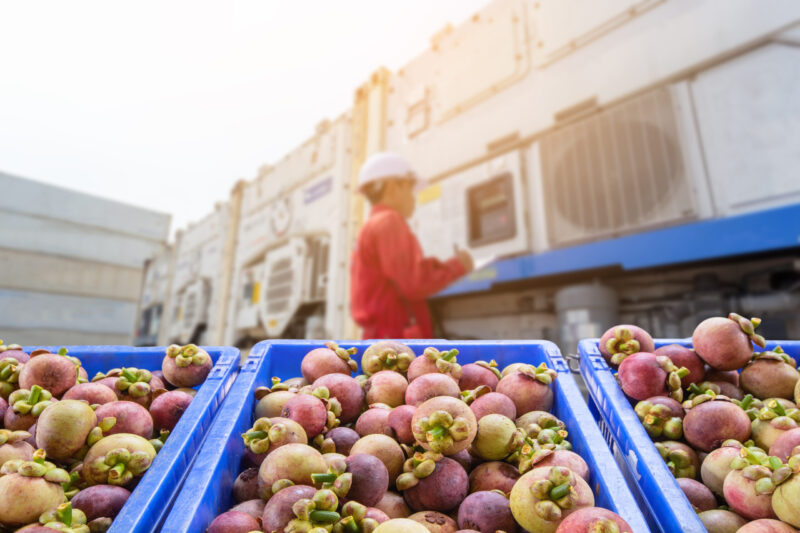
This site
is mobile
responsive

The advancement in global trade over the past few decades has shaped the supply chain industry, resulting in several innovations and evolution in business operations, equipment, and infrastructure – including those used for the storage and transportation of temperature-controlled products. The growing demand to transport temperature-sensitive products safely throughout the supply chain gave rise to the birth and development of cold chain logistics.
Cold chain logistics requires careful logistical planning as it involves safe and secure transportation methods – such as thermal and refrigerated packaging – and the usage of right material handling equipment. These methods ensure that product humidity levels are stable, which will protect the integrity and longevity of the cargo. Due to the temperature-sensitive nature of the products, cold chain logistics cover the production, storage, and end-user delivery stages while also taking into consideration that different products have different temperature requirements.
A study done by Ken Research Private Limited has indicated that the compounded annual growth rate (CAGR) for the cold chain market in Malaysia from 2016 until 2021 increased at a positive rate of 6.9%, mainly due to extensive government investments in the freight and logistics industry, an increase in consumer expenses, and growth in the pharmaceutical industry. The growth of the cold chain market in Malaysia is highly driven by the demand from pre- and post-production harvests and foods (including meat, seafood, fruits, and vegetables). At the same time, the COVID-19 pandemic has led to positive demand from the pharmaceutical and medical devices industries.
The study also highlighted that cold storage contributes to the highest revenue for the cold chain logistics market (with 70% of the market share, where the cold transportation market accounted for the remaining). Cold transportation via land makes up most of the market share for cold chain transportation in Malaysia, whereby the industry caters to the distribution of food and pharmaceutical products domestically, as well as internationally to Malaysia’s neighbouring countries (including Singapore, Thailand, Laos, and Vietnam).
Demand for halal cold chain logistics
Malaysia has established itself as a premier halal industry hub in the world, making it one of the major trading partners of halal meat and other products. According to the Halal Market Analysis Report 2020-2027, the global halal logistics market was valued at USD286.96 billion (RM1.29 trillion) in 2019, and is expected to expand at a CAGR of 8.4% from 2020 to 2027, the rise being primarily due to the growing Muslim population and the corresponding spending on halal products, as well as the growing global trade of halal food.
Hence, halal logistics has emerged as a possible growth prospect for logistics service providers. To maintain the halal assurance for halal products, utilising controlled temperature equipment and infrastructure is one of the characteristics of a halal supply chain. Temperature-controlled storage is one example of a value-added service in the halal logistics industry in Malaysia.
A helping hand
While the cold chain industry in Malaysia is growing, it is highly fragmented. The industry is considered a niche segment in the market, as there are not many players or service providers that offer cold chain services. Some companies are only focused on distribution and transportation, while others concentrate on the storage element of the cold supply chain.
With the positive outlook of the cold chain market, conventional logistics service providers have started to venture into the cold chain market by providing cold chain logistics solutions. A few of the prominent players in Malaysia are Tasco, Integrated Cold Chain Logistics, NL Cold Chain Network, and FRIO Logistics. Rising demand, cost-cutting technological advancements, and increased profitability have led to more cold chain logistics service providers starting to establish their presence in recent years.
The government introduced the cold chain investment incentive scheme back in 2001 with the aspiration to encourage independent service providers to venture into the cold chain market and provide logistical cold chain solutions, including cold storage and reefer transportation for local harvest producers. Over the years, many new and existing independent service providers as well as logistics companies in Malaysia have utilised this incentive package for the expansion and diversification of their business operations. Throughout the years, MIDA has approved 19 projects under this incentive scheme. Among them are local providers such as ILM Logistics (M) Sdn. Bhd., SK Cold Chain Solutions Sdn. Bhd., Integrated Cold Chain Logistics Sdn. Bhd., and Saddad Resources Sdn. Bhd.
As the need increases, the mismatch between demand and supply makes a good case for investment in cold chain logistics. MIDA continues to encourage quality investment in cold chain infrastructure and equipment, supporting facilities and integrated cold chain projects covering the point of origin to the point of consumption. For more information, please contact MIDA’s Oil and Gas, Maritime and Logistics Services Division.

